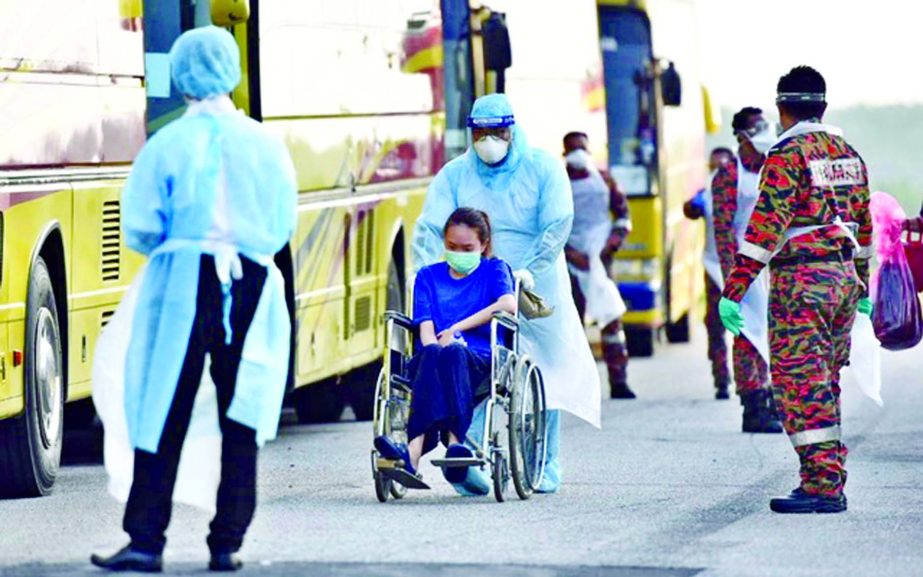
The New York Times :
One person was turned away by hotel after hotel after he showed his ID card. Another was expelled by fearful local villagers. A third found his most sensitive personal information leaked online after registering with authorities.
These outcasts are from Wuhan, the capital of Hubei province, where a rapidly spreading viral outbreak has killed more than 427 people in China and sent fear rippling around the world. They are pariahs in China, among the millions unable to go home and feared as potential carriers of the mysterious coronavirus.
All across the country, despite China’s vast surveillance network with its facial recognition systems and high-end cameras that is increasingly used to track its 1.4 billion people, the government has turned to familiar authoritarian techniques – like setting up dragnets and asking neighbours to inform on one another – as it tries to contain the outbreak.
It took authorities about five days to contact Harmo Tang, a college student studying in Wuhan, after he returned to his hometown, Linhai, in eastern Zhejiang province. Tang said he had already been under self-imposed isolation when local officials asked for his personal information, including name, address, phone number, identity card number and the date he returned from Wuhan. Within days, the information began to spread online, along with a list of others who returned to Linhai from Wuhan.
Local officials offered no explanation but returned a few days later to fasten police tape to his door and hang a sign that warned neighbours that a Wuhan returnee lived there. The sign included an informant hotline to call if anyone saw him or his family leave the apartment. Tang said he received about four calls a day from different local government departments.
“In reality there’s not much empathy,” he said. “It’s not a caring tone they’re using. It’s a warning tone. I don’t feel very comfortable about it.”
Of course, China has a major incentive to track down potential carriers of the disease. The coronavirus outbreak has put parts of the country under lockdown, brought the world’s second-largest economy to a virtual standstill and erected walls between China and the rest of the world.
Still, even some government officials called for understanding as concerns about prejudice spread. Experts warned such marginalisation of an already vulnerable group could prove counterproductive, further damaging public trust and sending those who should be screened and monitored deeper underground.
“We are paying attention to this issue,” Ma Guoqiang, the Chinese Communist Party secretary of Wuhan, said at a news conference there last Tuesday.
“I believe that some people may label Hubei people or report them, but I also think most people will treat Hubei people with a good heart.”
While networks of volunteers and Christian groups have been vocal about offering help, many local leaders have focused efforts on finding and isolating people from Hubei. On big screens and billboards, propaganda videos and posters warn people to stay inside, wear masks and wash hands.
One person was turned away by hotel after hotel after he showed his ID card. Another was expelled by fearful local villagers. A third found his most sensitive personal information leaked online after registering with authorities.
These outcasts are from Wuhan, the capital of Hubei province, where a rapidly spreading viral outbreak has killed more than 427 people in China and sent fear rippling around the world. They are pariahs in China, among the millions unable to go home and feared as potential carriers of the mysterious coronavirus.
All across the country, despite China’s vast surveillance network with its facial recognition systems and high-end cameras that is increasingly used to track its 1.4 billion people, the government has turned to familiar authoritarian techniques – like setting up dragnets and asking neighbours to inform on one another – as it tries to contain the outbreak.
It took authorities about five days to contact Harmo Tang, a college student studying in Wuhan, after he returned to his hometown, Linhai, in eastern Zhejiang province. Tang said he had already been under self-imposed isolation when local officials asked for his personal information, including name, address, phone number, identity card number and the date he returned from Wuhan. Within days, the information began to spread online, along with a list of others who returned to Linhai from Wuhan.
Local officials offered no explanation but returned a few days later to fasten police tape to his door and hang a sign that warned neighbours that a Wuhan returnee lived there. The sign included an informant hotline to call if anyone saw him or his family leave the apartment. Tang said he received about four calls a day from different local government departments.
“In reality there’s not much empathy,” he said. “It’s not a caring tone they’re using. It’s a warning tone. I don’t feel very comfortable about it.”
Of course, China has a major incentive to track down potential carriers of the disease. The coronavirus outbreak has put parts of the country under lockdown, brought the world’s second-largest economy to a virtual standstill and erected walls between China and the rest of the world.
Still, even some government officials called for understanding as concerns about prejudice spread. Experts warned such marginalisation of an already vulnerable group could prove counterproductive, further damaging public trust and sending those who should be screened and monitored deeper underground.
“We are paying attention to this issue,” Ma Guoqiang, the Chinese Communist Party secretary of Wuhan, said at a news conference there last Tuesday.
“I believe that some people may label Hubei people or report them, but I also think most people will treat Hubei people with a good heart.”
While networks of volunteers and Christian groups have been vocal about offering help, many local leaders have focused efforts on finding and isolating people from Hubei. On big screens and billboards, propaganda videos and posters warn people to stay inside, wear masks and wash hands.

